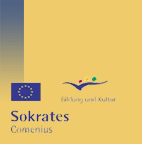|
Preparation: A finished self-made pinhole camera as
illustrative material.
Material for the children: Empty cardboard boxes and drums, tracing
paper, scissors, pens, tape, magnifying glasses.

|
Steps: The children examine the finished pinhole camera made of cardboard
(effect:
Picture is upside down).
Steps for making a pinhole camera:
- With the
help of the drum, draw a circle on the back of a box.
- Cut the
circle out carefully.
- Push the
drum into the hole. You must be able to shift it.
- Stick the
magnifying glass firmly on the end of the drum.
- Stick
tracing paper in front of the opening of the box.
- Hold the
camera in front of something bright, a candle or a light bulb. An image
of it appears on the tracing paper.
Afterwards the children
experiment with their self-made cameras by looking for objects which they
want to photograph or look at using their cameras. It will also become
clear that the picture is really sharp only at a certain distance.
|
|
Scientific explanation: The magnifying glass serves as a lens. It
disperses the arriving rays of light and throws the picture onto the tracing
paper. The picture is laterally reversed and upside down because the glass
bundles the rays of light and passes them on upside down.
In a real camera, a lens and a film are used instead of the magnifying
glass and the tracing paper. If the drum is pushed back and forth, the
picture comes into or out of focus, as when one uses the zoom of a real
camera. With bright and dark items the accuracy of the image changes.
|
Possible variation: Older children can first examine a simple old
camera and afterwards experiment with the material at hand until they have
found a correct solution. The experimentation phase and their discussions
make the children realize how a camera works. The nursery school teacher may
offer his / her assistance.
|
|
Note! Using magnifying glasses from an optician is easier then working with
those you can buy at a toystore that have a handle.
|
References:
Ardley, Neil: 101
spannende Experimente aus Wissenschaft und Technik. Bindlach 1996.
|











